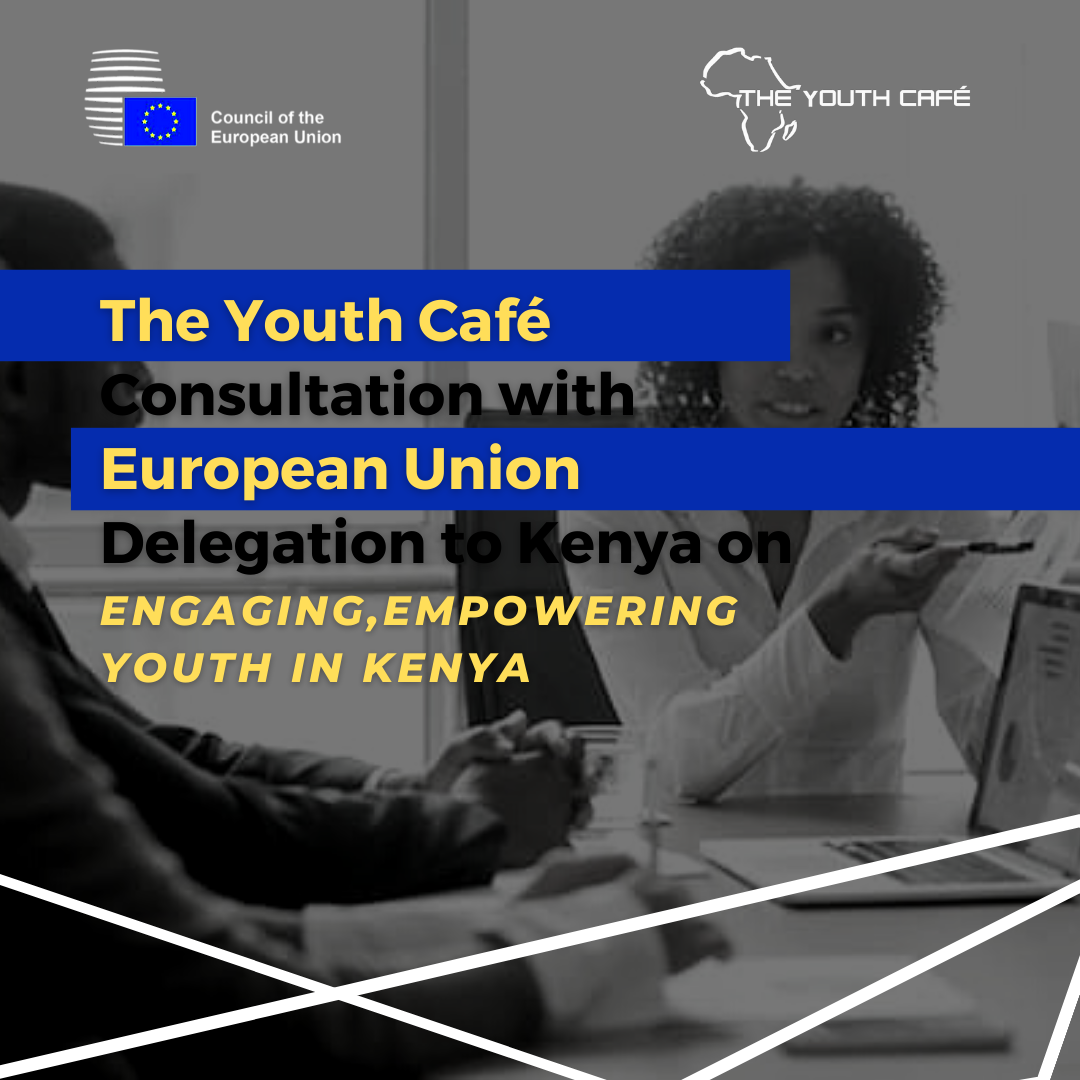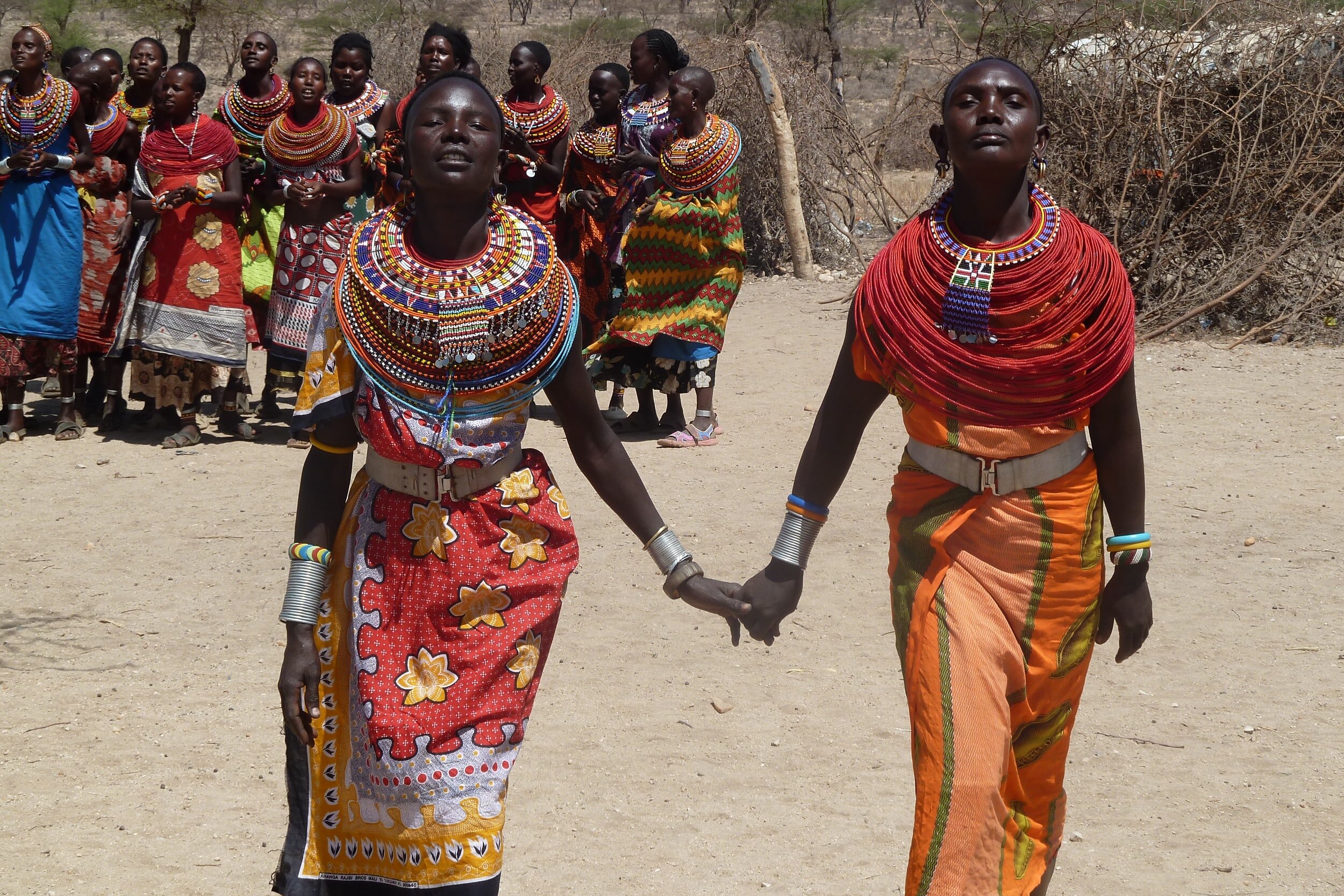The Youth Café Consultation With European Union Delegation To Kenya On Connecting, Engaging, And Empowering Youth In Kenya
Background and the Need for the Consultation
The youth in Kenya makes up a big chunk of the country's population, hence the need for policies that enhance their social and economic rights. There is also a great need to ensure that children, women, and the youth in Kenya easily access adequate food, water and sanitation, social security and proper training and education. The country is in the transformation phase characterized by the need to synthesize and strengthen democracy, governance and the economy.
To start with, there is specifically a great need to address the issue of skills mismatch between the education given to the youth and what the industry requires. There is also evidence of a disequilibrium of demand and supply of skills in the labour market. The disparity in the transition from the institutions into the job market is also due to outdated school curricula which therefore makes most courses unmarketable. Besides, a significant number of training institutions in Kenya do not have the necessary facilities and technology to prepare students for the challenging market demands.
There is a need to create employment for the youth. Every year, more than 5,000 young people graduate from various universities in Kenya. However, due to demand for experience, nepotism, poor policies, corruption, and slow economic growth, 75% of the youth remain unemployed. Various national and county youth policies have been developed in the country. Nevertheless, the youth have not been fully involved in decision-making, especially concerning issues that affect them.
More specifically, youth policies in Kenya have failed to support young people in pursuing their empowerment. For instance, youth in Kenya would wish to remove some of the requirements for job application in the country. Many youths in the country are locked out of available employment opportunities since they cannot afford these clearance certificates including certificates of good conduct, HELB clearance, Ethics & Anti-corruption Commission Clearance (E.A.C.C) and credit reference bureau clearance, all amounting to about KSh. 4,750.
It is also critical to create a supportive environment for youth to access credit and do business. The high rate of unemployment in the country has left the youth with self-employment to earn a living. However, young people cannot access credit for doing business from financial institutions due to lack of collateral, financial documentation, inability to repay, and their high-risk profiles. Mobile lending has become a necessary evil for the youth when it comes to financing. Nevertheless, most of these young people are lured into taking mobile loans which attract very high and unregulated interest rates. As a result, these loans end up leaving young people in a worse off situation and ultimately results in the increased cases of mental health issues like depression, murder, and suicide among young people in the country.
One of the biggest problems in youth empowerment and participation in the country is how to make sure that the youth are zealous about cringing transformation in the country. There is a great need for a youth-branded programme to speak, take action, and be heard freely and powerfully. Youth aged between 18 and 35 make up 75% of the country's entire population, a great economic and social energy source for Kenya. Still, much of this energy remains unexploited.
Older individuals control de facto decision-making power on the country's national and local budget. According to the Office of the United Nations High Commissioner for Human Rights, youth in Kenya lack the connection between their aspirations and strategies they can use to materialize them effectively. Empowering young people implies good governance, democracy, and an impetus for National Development.
The increased rates of harmful cultural practices and exploitation of young girls call for protection of this vulnerable population. Many young girls in Kenya are subjected to harmful traditional practices such as Female Genital Mutilation and forced early marriages. According to a recent survey by United Nations Population Fund 1 in 5 women aged between 15-49 years has been genitally mutilated, totaling approximately 4 million women subjected to Female Genital Mutilation. Still, Kenya encountered a dramatic increase in teenage pregnancies amid the COVID-19 period. A recent survey conducted by Global Citizen shows that the total number of pregnant teenage girls increased to 152,000 over three months, a 40% rise in the country's monthly average.
The problem of drug abuse among young people needs to be addressed especially in the urban areas of the country. Alcohol and substance abuse among young people has been on the rise in Kenya, with a prevalence rate of 25% and 20%, respectively. Among students, there is a great risk of poor academic performance and dropping out of college. A study at one Kenyan public university shows that the prevalence of substances in the country is 25.5%. The most abused substances are tobacco 7%, alcohol 22%, and cannabis 8%. Peer pressure is no longer the only contributing factor in new cases of drug abuse among the youth in Kenya. Today, the high rate of unemployment and idleness drive young people towards drugs, also closely related to crime, sexual and gender-based violence.
How the Consultation is Relevant to The Youth Café’s work
The consultation is relevant to The Youth Café’s work as it has been working with young men and women in Kenya and around Africa as a trailblazer in advancing youth-led approaches toward achieving sustainable development, social equity, innovative solutions, community resilience, and transformative change which is related to European Union’s Delegation to Kenya aim of engaging the youth and ensuring that young people, in particular attention to girls, are heard and empowered as young leaders so that they can be actors of change needed for sustainable development in Kenya.
The Youth Café is rooted on a strong notion of empowering young people to participate fully in democratic and economic processes. This is in order to create avenues to address the myriad social, economic, and political difficulties that the youth face. The Youth Café envisions a society where young men and women have full access to their social, economic, and political rights and possibilities.
By engaging with young people, leveraging research, learning, and adaptation, promoting sustainability and self-reliance, and advancing gender sensitive youth programming, The Youth Café’s Strategic Plan recognizes today's youth bulge as an opportunity for development and economic success. As a result, The Youth Café has a combined individual and organizational membership of 147,000 with a monthly digital reach of 400,000.
The Youth Café works with marginalized sections of youth such as youth living with disability, youth living in informal settlements, young women and girls, minority youth and indigenous youth covering all the 47 counties in Kenya. In its new strategic plan, the organization will endeavour to ensure the provision, protection, and involvement of youth in economic and social rights.
This is reflected in the organization's goals, which include training and increasing the quantity and quality of youth in leadership positions, harnessing young people's voices and contributions in the implementation of the new Africa Youth Charter, facilitating an environment where youth can promote a peaceful and cohesive Africa Continent, and conducting critical action-oriented policy research and analysis and enhance legislative support on youth, leadership.
Our potential participation and what it will bring to the table
EU Joint Cooperation strategy coincides with The Youth Café’s Theory of Change and Strategic Plan. The ultimate goal of The Youth Café is to advance youth-led approaches towards sustainable development, social equity, innovative solutions, community resilience, and transformative change. The Youth Café has grown tremendously in stature over the last seven years by supporting good transformation. This has been accomplished through raising youth awareness and cultivating young ethical leaders throughout the Republic.
Today, The Youth Café can speak of increased youth awareness as a result of their involvement in critical governance, as well as increased youth engagement in critical governance, increased visibility of young people in leadership positions across sectors, and the proliferation of youth-led organizations working to make a positive difference.
Through our Strategic Plan and Theory of Change, we will participate more logically with the youth in Kenya to ensure that the voices of young people are not only heard but also empowered. Empowering the youth as young leaders is crucial for them to be actors of change, a prerequisite for sustainable development in Kenya. The Youth Café will be focusing on two of our eight priorities: Governance and Political inclusion and Peace and Security, including preventing violent extremism.
Concerning EU’s 1st priority area, Accountability and Governance, The Youth Café will help increase the generation of domestic resources and eradication of high levels of poverty through advocating for changes in the legal and regulatory framework to ensure that the young people and especially the 'undocumented', 'unbanked' and poor are not further disenfranchised.
Concerning the EU's second priority area, Employment Creation, we will integrate our 7th priority area, which is Business, Job Creation and Entrepreneurship in our Theory of Change. We aim to create a business acceleration program and start-up capital to support young people who have great business ideas but lack the financial means to kick off their businesses. As a way of representing the youth in Kenya, The Youth Café hopes to champion for adjustments in the Employment Amendment Bill. The Youth Café envisions these requirements being removed as a prerequisite for job application in the country, a strategy that will allow the youth to submit job applications at a lower cost. This approach can be made possible by providing training and mentorship opportunities for young people to leverage and create self-employment.
Do you have any questions or comments? Contact us or give us some feedback.





